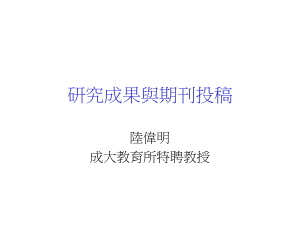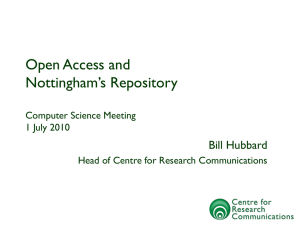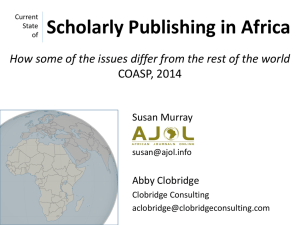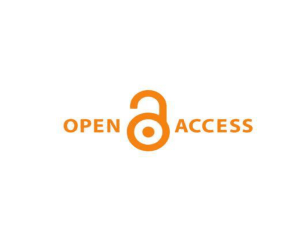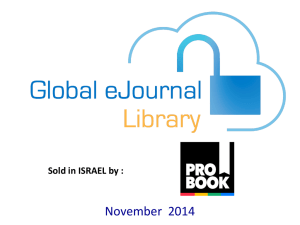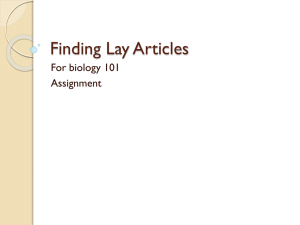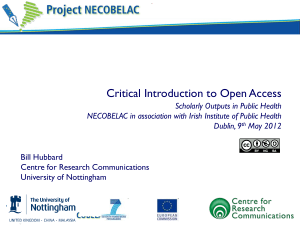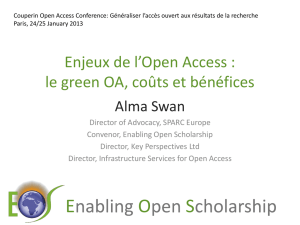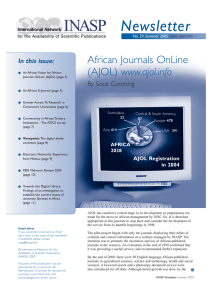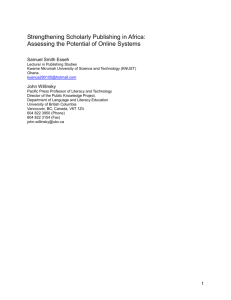Introduction of Open Access and its Principles
advertisement
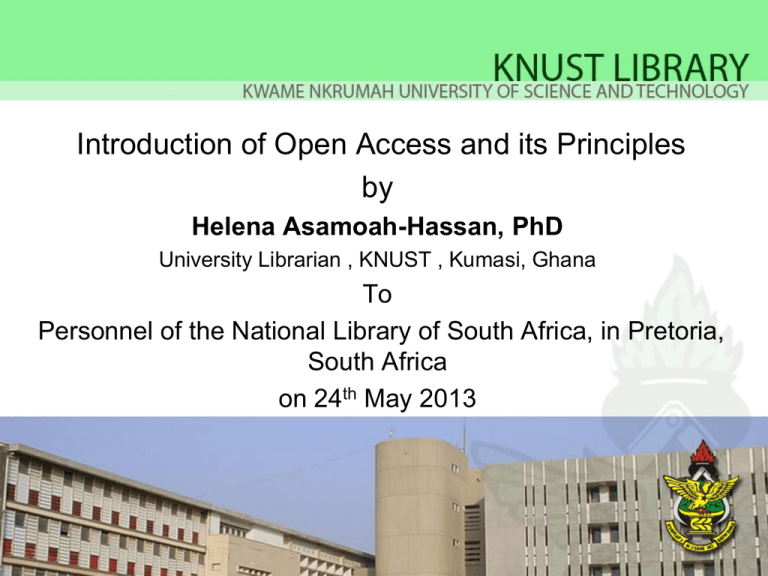
Introduction of Open Access and its Principles by Helena Asamoah-Hassan, PhD University Librarian , KNUST , Kumasi, Ghana To Personnel of the National Library of South Africa, in Pretoria, South Africa on 24th May 2013 Outline • • • • Introduction Overview of Open Access OA Principles Open Access Initiatives for developing countries • Open Access Initiatives in Africa • Suggestions 2 Introduction • OA is a public good. Published information is public information and so should be accessible. • OA is good for scholarship, good for business, good for development and good for the people. • The trend today is not money in a few peoples pockets but information availability to a lot of people to enable the creation of knowledge and innovation and this is what OA seeks to do. • Scholarship should be used, re-used and be re- usable. • National platform for OA through IRs and OA Journals with government support is very critical. 3 What is an Open Access Publication? • Research articles or publications that are freely available on the internet, that permits any user to read, download, copy, distribute or print the articles or publications,… pass them as data to software, or use them lawfully , without any financial, legal, or technical barriers. The only constraint when reproducing, and distributing, and for copyright is to give authors control over the integrity of their work and to properly cite and acknowledge them. (Budapest Open Access Initiative). • In effect, an OA publication is one that is freely available on the internet and can be freely used, on condition that the author is properly and accurately acknowledged. 4 Why OA Publishing in Developing Countries? • Researchers in developing countries face challenges of -Limited equipment and facilities; -Funding; -limited access to research from , & journals published in ,the north because libraries cannot afford to subscribe to several titles. • OA in developing countries is geared towards - increasing access to research results from the south; - making authors from the south and their institutions visible as well as their research results more cited. - enabling collaboration in research and access to more research funding. 5 Benefits & Obstacles of OA to developing countries • Major Benefits - Unrestricted access to knowledge - Speed and reduced cost of distribution - Access to grey literatures from developing world - Expanded opportunity to publish • Major Obstacles - Poor State of ICT - limited computer literacy; high cost of internet access limiting access ; low bandwidth. - Copyright issues - authors sign away their rights and so cannot self archive their own papers. - Misconception of Open Access resulting from lack of awareness. 6 KEY OPEN ACCESS PRINCIPLE Free availability of knowledge on the public internet permitting users to read, down load, copy, distribute, print, search, or link to the full texts, crawl them for indexing, pass them as data to software, or use them for any other lawful purpose, without financial, legal or technical barriers other than those inseparable from gaining access to the internet itself. The only constraint on reproduction and distribution and the only role for copyright in this domain, should be to give authors control over the integrity of their work and the right to be properly acknowledged and cited OTHER OA PRINCIPLES • Making (African) research available to other researchers. • Making research done in other places available to other (African) researchers. • Assisting in bringing together global research output of scientists as well as the scientists themselves. • Enhancing research funding opportunities and collaboration among researchers. • Setting up of Policies by institutions to enable mandatory deposits in the IR by researchers. Open Access Repository sites around the world 9 OA Repositories – Global (Green Publishing) Open Access Repositories (ROAR) (http://roar.eprints.org/ ) Directory of Open Access Repositories (OpenDOAR) (www.opendoar.org) 1223 in Europe 534 in Asia 471 in North America 266 in South America 91 in Oceania 78 in Africa 1073 in Europe 484 in North America 391 in Asia 177 in South America 62 in Africa 61 in Oceania 10 OA Repositories - Africa (Green Publishing) (www.opendoar.org/countrylist.php) 2011 • • • • • • • • • • • 52 South Africa -24; Egypt -6; Kenya -4; Nigeria-3; Zimbabwe - 1 Mozambique, -2 Namibia -2 Sudan -2 ; Ghana -1, Malawi-1 Botswana, Cape Verde, Ethiopia, Senegal, Tunisia, Uganda – 1 each • • • • • • • • • • • • 2013 South Africa -24; Egypt -6; Kenya -7; Nigeria- 6; Zimbabwe -3; Mozambique - 1, Namibia – 2 Sudan -2 ; Ghana - 2 Tanzania – 2 Malawi - 0, Botswana, Cape Verde, Cameroon, Ethiopia, Senegal, Tunisia, Uganda – 1 each • 62 11 African Open Access Journals in DOAJ (Gold Publishing) • • • • • • • • • • Egypt – 351 South Africa – 56 Nigeria – 26 Tunisia – 10 Kenya – 6 Morocco - 6 Ethiopia – 5 Uganda – 4 Tanzania – 3 Algeria – 2 • • • • • • • Ghana - 2 Libya – 2 Burundi – 1 Cote d’Ivoire – 1 Madagascar – 1 Sierra Leone – 1 Zambia – 1 Total = 478 12 Open Access Journals – AJOL (Gold Publishing) About 150 OA Journals out of 450 total Journals in AJOL • • • • • • • • • • • • Nigeria – 48 South Africa – 40 Ethiopia – 13 Kenya – 11 Egypt – 6 Ghana -5 Senegal – 5 Uganda – 3 Tanzania – 3 Cote d’Ivoire – 2 Mauritius – 2 Tunisia – 2 • • • • • • • • • • Botswana – 1 Cameroon – 1 Eritrea – 1 Libya – 1 Madagascar – 1 Malawi – 1 Rwanda - 1 Sierra Leone – 1 Sudan – 1 Zambia – 1 http://www.ajol.info/index.php/ajol/browse/alpha? letter=oa 13 Some Open Access Initiatives for Developing Countries • • • • • • • Health Inter Network Access to Research Initiative (HINARI) Access to Global Online Research in Agriculture (AGORA) Online Access to Research in the Environment (OARE) ARDI Bioline International Electronic Information for Libraries (EIFL) BioMed Central 14 Some Big African OA Initiatives • African Journals Online – 1998 www.ajol.info/ • African Digital Library - 1999 africaeducation.org/adl/ • Database of African Theses and Dissertations – 2003 www.aau.org/datad • Africa’s Open Knowledge Network – 2003 • African Online Digital Library www.aodl.org/ • ASKIA of the UN Economic Commission in Addis Ababa 15 Suggestions • National Repository has to be the responsibility of a National Library just as the national bibliography is. • Library must have a dedicated Department for IR • Advocate with stakeholders- Institution’s Authorities / Administration, Library ICT Personnel and Users • Revisit the institution’s Mission and include OA. • Government must be committed in setting up and sustaining IR and make output of funded research available for public use through it. 16 Suggestions • Build networks and partnerships, twin with other OA compliant institutions(south-south, south-north)for research and knowledge exchange. • Register IR with Directories and Registries for easy searchability - http://roar.eprints.org/; http://www.opendoar.org/ ; http://maps.repository66.org/ • Important to install a bold national OA-friendly Policy framework including for public-funded research which must be aligned with existing National and Regional Policies on OA. For a model see http://osc.hul.harvard.edu/ For inquiries go to osc@hulmail.harvard.edu 17 Suggestions • The Library should promote OA publishing through: - creating and maintaining an OA Archive (IR) and assisting authors to self archive and also do mediated archiving. - publishing OA journals, with the library setting up and maintaining it. - searching and adding OA resources, OA journal directories and search engines on their web interfaces. • Before all these are done it is important to examine the mandate of the National Library to see if it can accommodate OA in its existing mandate or if it can revise its mandate to include OA. 18 Conclusion • OA to information has come to stay and so libraries in Africa must accept it in order to reap its enviable benefits. • Important to advocate for the necessary protocols to be put in place. • Important to secure the buy-in of stakeholders. • Very important to advocate for a National IR which will bring all the scattered IRs in the country together – for national development. 19 20
